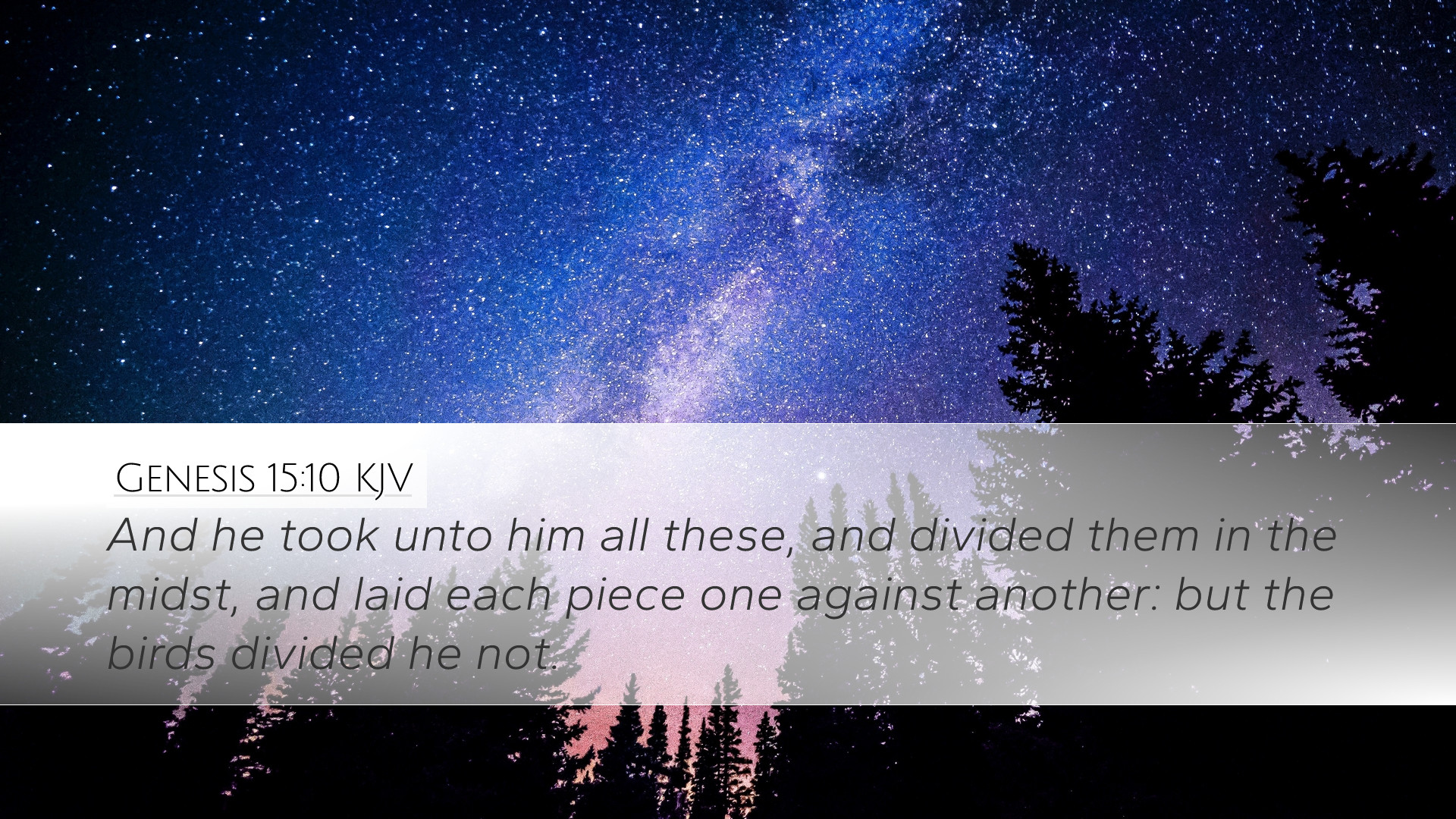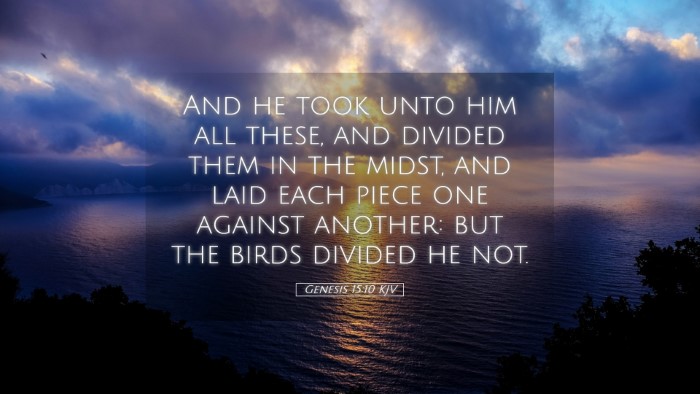Commentary on Genesis 15:10
In Genesis 15:10, we find a significant moment in the narrative of God's covenant with Abraham. The verse states:
“And he took unto him all these, and divided them in the midst, and laid each piece one against another: but the birds divided he not.”
This passage is pivotal for understanding the ancient Near Eastern covenant-making traditions, the symbolism of sacrifice, and God’s promises to Abraham.
Understanding the Context
The broader context of Genesis 15 reveals God’s promises to Abraham regarding his descendants and land. This chapter is particularly important as it introduces God's covenant, which is foundational for Israel’s identity.
Covenantal Significance
In ancient cultures, covenants were often formalized through the ritual of animal sacrifice. By cutting animals in two and laying the pieces apart, the parties involved would symbolize the seriousness of the covenant. Albert Barnes emphasizes that this act illustrates the gravity of the commitment being made, as it signifies that if one were to break the covenant, the same fate would await them as the animals (Barnes' Notes).
Symbolism of the Sacrifice
The phrase “he took unto him all these” indicates that Abraham was obedient in gathering the animals required for this covenant. Matthew Henry notes that this selection includes specific types of animals: a heifer, a goat, a ram, and birds, each representing different aspects of sacrifice and serving to foreshadow the ultimate covenant fulfilled in Christ.
Adam Clarke suggests that the act of dividing these animals highlights Abraham's understanding of the solemnity and gravity associated with covenant-making. The division of the animals serves also to attend to the idea that God is establishing a serious and eternal promise, setting Abraham apart as the father of many nations.
Abraham's Faith and Doubt
It's essential to recognize Abraham's faith at this point in the narrative. As examined by various commentaries, Abraham’s response to God’s promise was not merely passive acceptance. In the preceding verses, we see a man grappling with doubt and seeking reassurance from God.
- Faith in Action: Abraham, despite his doubts, acts on God’s instructions, illustrating a dynamic relationship characterized by dialogue and active obedience.
- Foreshadowing Future Sacrifice: The rituals of sacrifice foreshadow the ultimate sacrifice found in the New Covenant through Jesus Christ. Henry mentions how this points forward to the Lamb of God.
The Idea of Unbroken Sacrifice
The verse also notes that “the birds divided he not.” This detail may suggest a sense of completeness in the offerings. As observed in various commentaries, the omission of dividing the birds speaks to the nature of God’s covenant—more profound than immediate ceremonial acts. It reflects the holistic and unwavering promise God is presenting to Abraham.
Implications for Believers
This verse holds rich theological implications for pastors, students, and scholars today. It emphasizes themes of faith, the seriousness of God's promises, and the importance of commitment in relationships with God. It serves as a reminder that God's promises are comprehensive and enduring amid human doubt and struggle.
Lessons for Today’s Believers
- Faith in God’s Promises: Like Abraham, believers are encouraged to trust in God's promises, even when they seem improbable or impossible.
- The Cost of Covenant: Reflect on the seriousness of our commitments before God—what we are willing to sacrifice or align our lives with.
- The Nature of God’s Promises: Understand that God's confirmation often requires a response of faith and action on our part, as shown through Abraham's obedience.
Conclusion
Genesis 15:10 is a profound reflection of God's covenantal love and the faith of Abraham as an exemplification of belief amid uncertainty. This passage serves as a bridge from the patriarchal promises to the realization of those promises in Christ. For pastors and theologians, it stresses the importance of maintaining a covenant relationship with God characterized by faith, obedience, and understanding the cost associated with such commitments.


